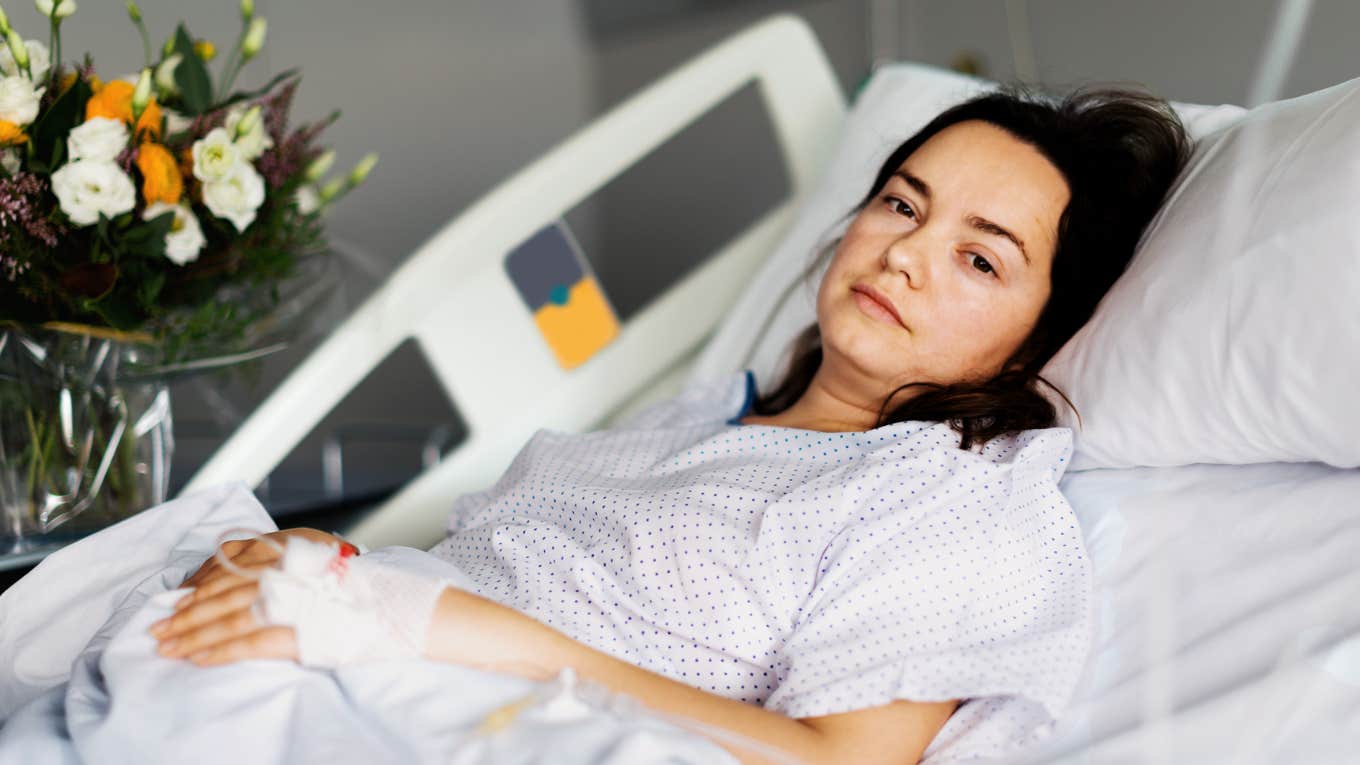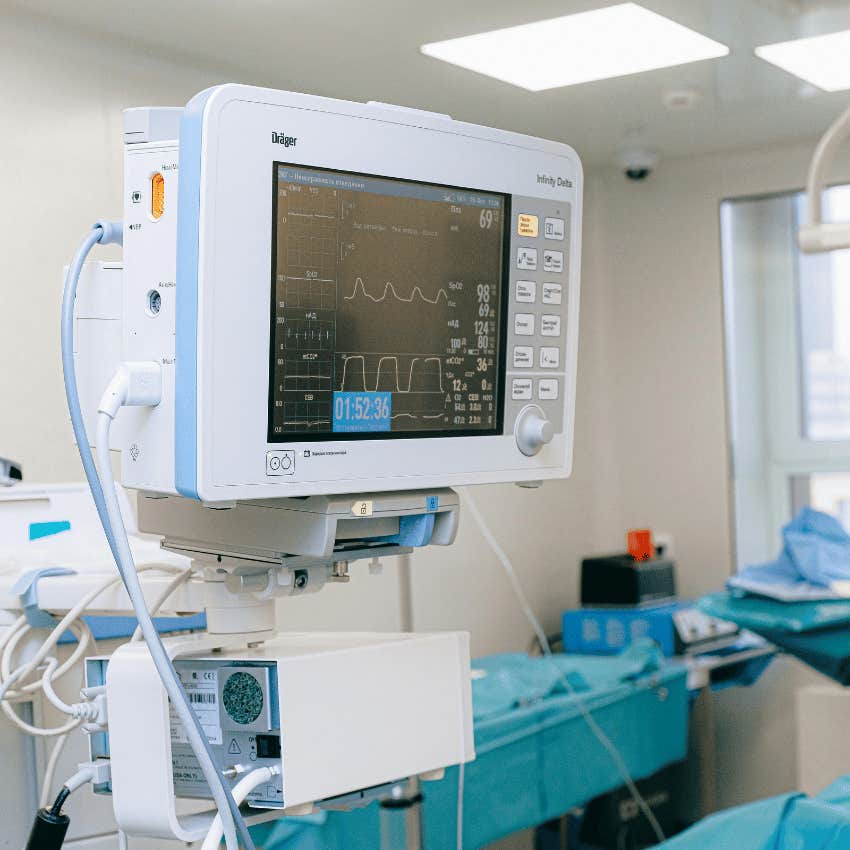The Medical Condition I Almost Missed — 'If I Had Gone Back To Sleep, I Would've Died'
This is no longer the body I know, but I'm still here.
 BearFotos | Shutterstock
BearFotos | Shutterstock This is not the body I know. I survey the damage. Bruising, trailing my left leg to the groin, under the knee where they took a vein. My arms are laden with track marks of IVs and blood withdrawals, and a green and blue tinge runs from my wrist to my elbow.
My neck has a hole in it from where an IV sat, and it’s greenish yellow, starting to heal. I step back. The incision down the center of my chest is black and blue and green and yellow. It feels like someone put a plate of armor inside me and left it there by accident. This is not the body I know.
My frame, a tiny 5’1’ even at 61, had some muscle still, a remnant of athletic, productive life, lifting thousands of pounds of weights, carving my body into a sculpture, and cartwheeling into happiness. I was always moving.
I look again. My decimated frame lacks any trace of what I used to be or done. Gone are the little muscles that I worked so hard to build. But I’m still here.
A month ago, I woke up in the middle of the night not feeling great.
Indigestion, maybe. I paced, took Tums, and still the feeling lingered. I drank water and took half a Xanax, thinking it would put me back to sleep. My husband suggested that maybe it was something I ate, so I returned to bed.
I soon vomited and got in the shower, thinking this would make me feel better, also knowing I was probably going to the ER. A tingling in my left hand and arm, constant. When it didn’t subside, I got dressed and said, “Go back to bed. I’ll drive myself to the hospital.” I did not want to wake our son or cause any commotion.
I drove twenty minutes to the ER, stopping at every light. I repeated, “Someone help me,” repeatedly, and breathed slowly while focusing on the road. The time was 1:00 am.
A whoosh of humid air hit me as I got out of the car and locked it, walking slowly to the entrance. And then a burst of cold. I was sweating but shivering.
Questions — so many questions, forms, and a convergence of people placing electrodes with cold fingers and rolling an EKG machine in. “Am I having a heart attack?"
Almost immediately, “Yes, you are having a heart attack.”
There are too many people in and out of the room now, and I’m tired. “We’re going to transfer you. We are not a cardiac hospital.” They put me on a gurney with a clanking wheel and took me out to a waiting ambulance, where the ride was violent but expeditious.
The rush of the hot, humid air and the musty ambulance collide, and I notice no one is sitting beside me. Finally, they stop. I don’t enjoy fast driving, even if it is to save my life.
In the hospital, they were already waiting, and I remember the nurse telling me they were taking everything off. I thought to myself, ‘Don’t lose my shorts; they’re Lululemon.’
A cardiologist at the ready does a stent to take care of an artery 100 percent blocked, and I awake in the cardiac ICU of our local cardiac hospital.
When lying in a hospital bed, you tend to focus on things other people can’t understand. You don’t feel like yourself. You might never feel like yourself again.
People come in and out: visitors, nurses, doctors, people delivering food, people delivering good news or bad, whichever day it happens to be. And you feel like an imposter sitting there because this can’t be real life, right?
When the dietician comes in, I laugh and tell her she can leave. “I know everything you are going to say to me. I apologize for my rudeness.” I have lived in a dietary state for more than half my life, possibly most of my adult life, being careful, watching everything, and depriving myself so that this exact thing wouldn’t happen.
After the stent, I am given a specific blood thinner in error, which takes seven days to leave my carcass of a body. So, I sit in a holding pattern, waiting to see if I need anything else for my poor, broken heart.
I take a turn for the worse between being out of the ICU onto the regular floor and finding myself back in the ICU the following day.
The nurse on the Thunderdome floor tells me it’s anxiety, and every hour or so, I am calling in pain. Nothing is addressed till early in the a.m. when a crowd fills the room to see why it hasn’t been alerted to the doctors. Morphine isn’t touching my pain, and it’s relentless.
I developed phlebitis in my left arm because the medicine intended for the IV infiltrated the subcutaneous tissue surrounding it. They eventually removed the IV and had to give me six shots surrounding the tissue. And it’s painful and red, and I cannot move it.
I developed a kink in the IV in the right arm, and it leaves me wondering why they place it there when it’s one natural inclination to bend the dominant arm. No one has the answer. They eventually bring the head IV man in with all the credentials, and he brings with him the longest needle I’d ever seen and an ultrasound to place it exactly where he wants it, and it makes two IVs in one arm. Dandy.
To say the nurses during this time were angels would be an understatement. They were collectively beautiful, smart, funny, articulate, efficient, and did whatever was in their power to make me feel better from getting warm blankets, hunting down Jell-O, indulging in my 5 a.m. ritual of washing my hair in the sink and telling me about their lives outside the hospital.
There is a distinct difference when you are ill; you can tell the nurses whose job is a calling over those who are there for a job. Every day, I made it a point to ask their names and questions. I tell them something good, like how they were important and helpful. They work 12-hour shifts, rarely taking a moment, and I always tried to let them know how thankful I was.
 Anna Shvets | Pexels
Anna Shvets | Pexels
The Cardiologist who did my stent scolded me for not taking medication. I stammered, “They said my blood work was okay.” He growled, “It doesn’t matter when you have a family history. You need medication.” He was horrible and saved me at the same time.
Now, looking back, I worked hard to get my numbers down and was offered medication. But I resisted. And they agreed I had been able to drop the numbers significantly. Compounding the issue, I was given a pass by doctors because of what I looked like.
When meeting the surgeon, he was a complete contrast to the Cardiologist. Light and friendly, smiling. He came in asking questions and gently said, “You are not our typical case. You are in good shape. You’re not a smoker or drinker. It makes little sense, except for your family history and everyday stress.”
Regardless of my family’s affinity for heart issues, I cried when finding out I’d need open heart surgery.
The nurse came and sat with me and held my hand, murmuring to me until I was ready for her to let go. I felt a bit of shame attached to it all. In 2017, I had a clear scan, so in a few short years, something had changed. My bloodwork was good, and this was different from a typical thing. The Pulmonologist said every day when he came to check on me, “I’m not worried about you.”
I waited a week for surgery until the blood thinner was not a threat to my little skeletal frame, and during that time, I developed a sleeping problem where I kept feeling like I was falling, and then it was like jumping back out of sleep.
There is no real sleep in the hospital, and as a last resort, they gave me Melatonin, which made me have night terrors and I said ‘no thanks’ to any further doses. I'm still not sleeping, but a few hours here and there.
The triple bypass surgery came and went. It was successful, and they sent me home soon after. It was the most challenging thing to date I have experienced.
Research has shown that women may have different heart attack symptoms than men. They're more likely to experience fatigue, nausea, and sweating — minor-seeming reactions that could deter them from getting care.
Research has also shown that following surgery, over 50% of cardiac surgery patients report anxiety, stress, and/or depression, with at least 10% meeting clinical diagnoses. Psychological distress predicts post-surgery health outcomes for cardiac patients. Therefore, post-operative distress represents a critical recovery challenge affecting both physical and psychological health.
I look like a different person than who went into the hospital. If I had gone back to sleep, I would have died. But I’m still here.
Lisa Bowden is a writer, researcher, and fitness enthusiast and has had articles featured in Flex Magazine, Muscular Development, Gorgo Fitness Magazine, Complete Human Performance, and many other periodicals. She is a lover of cider donuts of the Northeast and fall weather.

